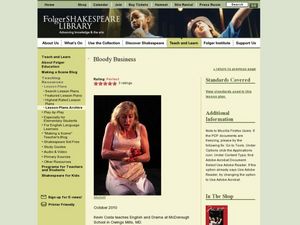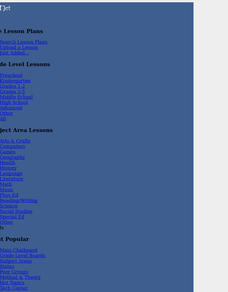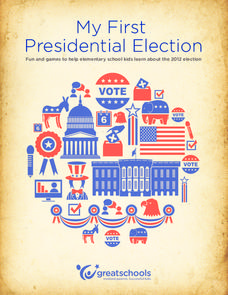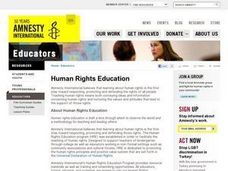EngageNY
Using Informational Text Features and Learning Freaky Frog Vocabulary
What kind of text features help children build a strong vocabulary? Class members use text features such as headers to unpack new vocabulary words. They create vocabulary journals in which they will write what they think the definition...
Pittford Schools
Literary Devices, Techniques, and Elements
What's the difference between a speaker and an author? What's an example of anthropomorphism? Clarify the meanings of literary devices, elements, and techniques with a comprehensive glossary of terms.
Curated OER
Locate Key Information in Nonfiction Text
Interpret nonfiction text with your class. Readers use key information found in nonfiction text to answer questions and problem solve. They utilize the chapter headings, diagrams, glossary, maps, and captions as well as the table of...
Curated OER
Bloody Business
Students research word frequencies in Macbeth and create a frozen picture inspired by a word. In this Macbeth lesson, students view Blood Will Have Blood and discuss the dual meaning of the word "blood." Students identify five major...
Curated OER
The Meaning Of Percent
This lesson provides students with a variety of exercises which allow them to increase their ability to understand percentage.
EngageNY
Relationships Between Key Scientific Concepts: What Causes Hurricanes?
A storm is brewing in the sea. Scholars complete multiple reads of How Does a Hurricane Form to determine gist, cause-and-effect relationships, and deepen vocabulary understanding. To finish, they complete graphic organizers to record...
Curated OER
"Pray, Why Speakest Thou Thusly?"
Examine popular language and slang and how they have changed over the course of American history. Conduct Internet research, use an online interactive Colonial House website to translate 17th century language into 21st century language,...
Curated OER
School - Home Links: Parts of a Book
Parents or learning partners assist emergent readers with a School-Home Links worksheet. The children complete a matching activity about the parts of a book which include a table of contents, title page, and glossary. They match the word...
Curated OER
Definition Expedition
Students study about three ways to define a term in technical writing, search the Web for scientific text, then copy and paste sections into a Word document. Finally, they use the highlighter feature of Word to highlight examples of...
Curated OER
Geographically Speaking
Students play a matching game to reinforce the retention of vocabulary words. In this geography lesson, students watch a PowerPoint to define vocabulary words associated with geography, play a memory game with the words, and write an...
Curated OER
Human Impact Starts with?
What kind of effects do humans have on their environment? Review key anthropogenic vocabulary with a fill-in-the-blank handout. You may wish to use this as an ongoing glossary, review before a test, or even create a crossword puzzle or...
Curated OER
Dictionary Skills
Second graders use resources such as dictionaries and glossaries correctly to build word meaning and to practice all uses of their references; students also practice alphabetical order while locating information.
Curated OER
Reading Comprehension: Context Clues
Fifth graders use context clues to help them understand unknown words. In this context clues lesson, 5th graders practice identifying context clues on a worksheet, then work with a peer to write their own story. Stories are peer edited...
Curated OER
Introduction to "The Secret School"
Fourth graders read The Secret School and define vocabulary in the text. In this Secret School lesson, 4th graders recognize difficult text and are able to comprehend its meaning and answer questions.
Curated OER
Waste Management
Students explore the topic of waste management. They define key vocabulary words, take a pre-quiz, complete a questionnaire, evaluate their own waste reduction habits, and write a short summary.
Great Schools
My First Presidential Election
Register, establish a platform, make campaign speeches, and design campaign advertisements with a study of presidential elections. Young citizens engage in various activities that mimic the election process.
Wells Fargo
Hands on Banking
Cha-ching! You just hit the jackpot with this interactive consumer math unit. Supported by a series of online lessons and activities, these lessons engage students in applying their math skills to real-life personal finance problems...
Federal Reserve Bank
Money and Inflation: A Functional Relationship
What is the difference between money and bartering, and how is money valued when considering inflation? Delve into the correlation between these fundamental components of economics with this detailed resource, which consists of reading...
Curated OER
Amandla!
Students sing a South African song and fill in blank words. They draw images that the song brings to mind while working in groups. Then, they share their art projects with the class.
Curated OER
Constitution and the Bill of Rights
Fourth graders explore the information of the index of the Constitution. In this Constitution and Bill of Rights lesson, 4th graders complete a worksheet by locating keywords in the index. Students understand the importance of using an...
Curated OER
Dichotomous Keys
Students define the word dichotomous and explain why a dichotomous key is a useful tool in identifying different species. Then they look up words they are unfamiliar with or mollusk reference books so students can
learn the names of...
Curated OER
“Home on the Range”
Fourth graders analyze the song "Home on the Range" and identify its meaning and setting. For this timeline and retelling lesson, 4th graders use dictionaries to find definitions of unfamiliar words, create a timeline and retell the...
Curated OER
Oceans and Coasts
Learners explore the topic of marine pollution. They define key vocabulary words, list examples of marine pollution, complete a true/false handout, read an article, and participate in a class discussion.
Curated OER
Putting a Spin on Current Events
Students discover propaganda. In this Greek mythology lesson plan, students discuss meanings of ancient art work with their class. Students investigate the dishonesty behind propaganda.

























